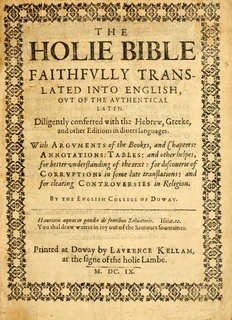Related Research Articles

William Allen, also known as Guilielmus Alanus or Gulielmus Alanus, was an English Cardinal of the Roman Catholic Church. He was an ordained priest, but was never a bishop. His main role was setting up colleges to train English missionary priests with the mission of returning secretly to England to keep Roman Catholicism alive there. Allen assisted in the planning of the Spanish Armada's attempted invasion of England in 1588. It failed badly, but if it had succeeded he would probably have been made Archbishop of Canterbury and Lord Chancellor. The Douai-Rheims Bible, a complete translation into English from the Latin, was printed under Allen's orders. His activities were part of the Counter Reformation, but they led to an intense response in England and in Ireland. He advised and recommended Pope Pius V to pronounce Elizabeth I deposed. After the Pope declared her excommunicated and deposed, Elizabeth intensified the persecution of her Roman Catholic religious opponents. William Cecil said to Elizabeth "The Papist humors by your Queen Majesty's lenity grow too rank."

The Douay–Rheims Bible is a translation of the Bible from the Latin Vulgate into English made by members of the English College, Douai, in the service of the Catholic Church. The New Testament portion was published in Reims, France, in 1582, in one volume with extensive commentary and notes. The Old Testament portion was published in two volumes twenty-seven years later in 1609 and 1610 by the University of Douai. The first volume, covering Genesis through Job, was published in 1609; the second, covering Psalms to 2 Machabees plus the deuterocanonical books of the Vulgate, was published in 1610. Marginal notes took up the bulk of the volumes and had a strong polemical and patristic character. They offered insights on issues of translation, and on the Hebrew and Greek source texts of the Vulgate.
The English College, was a Catholic seminary in Douai, France, associated with the University of Douai. It was established in about 1561, and was suppressed in 1793. It is known for a Bible translation referred to as the Douay–Rheims Bible. Of over 300 priests from Douai sent on the English mission, about one-third were executed. The dissolution of the college at the time of the French Revolution led to the founding of Crook Hall near Lanchester in County Durham, and St Edmund's College, Ware. It is popularly believed that the indemnification funds paid by the French for the seizure of Douai's property were diverted by the British commissioners to complete the furnishings of George IV's Royal Pavilion at Brighton.
Thomas Worthington, D.D. was an English Catholic priest and third President of Douai College.

Thomas Stapleton was an English Catholic controversialist.

The Reverend Father Gregory Martin was an English Catholic Priest, a noted scholar of his time, academic and Doctor of Divinity, and served as the chief translator of the Rheims and Douai Version of the Bible, the first full, official Catholic English Bible translation, translated from the Latin Vulgate.
Nicholas Fitzherbert was an English recusant gentleman who served as secretary to Cardinal William Allen and was found guilty of treason due to his Catholicism. He was the second son of John Fitzherbert of Padley, Derbyshire. Fitzherbert was the grandson of the judge Sir Anthony Fitzherbert (1470–1538), and first cousin to the Jesuit Thomas Fitzherbert. Whilst he was abroad, two priests were arrested at his father's house; they are now saints after becoming martyrs to their faith. Fitzherbert's lands were forfeit, and he was obliged to spend his life abroad. He was buried in Florence.
Gabriel Gifford OSB was an English Roman Catholic Benedictine monk who became Archbishop of Reims.
William Holt (1545–1599) was an English Jesuit.
Matthew Kellison was an English Roman Catholic theologian and controversialist, and a reforming president of the English College, Douai.
George Musket, alias Fisher was an English Roman Catholic priest and controversialist. On the English mission he was under sentence of death for around 20 years, but survived.
George Leyburn was an English Catholic priest, who became President of the English College, Douai.
Francis Gage (1621–1682) was an English Roman Catholic priest, who became President of the English College, Douai.
William Baldwin or Bawden (1563–1632), was an English Jesuit implicated in the Gunpowder plot.
Gregory Stapleton D.D. (1748–1802) was an English Roman Catholic bishop. While president of St. Omer's College, he and his students were imprisoned during the French Revolution.
Humphrey Ely, LL.D., was an English Catholic divine.
Henry Floyd (1563–1641) was an English Jesuit.
Thomas Wright, was a Roman Catholic controversialist, who was ordained priest in the reign of Queen Mary, and became one of the readers of divinity in the English College, Douai at the time of its foundation in 1569.
William Bell was an English lawyer.
Robert Witham (1667–1738) was an English Roman Catholic college head and biblical scholar.
References
. Dictionary of National Biography . London: Smith, Elder & Co. 1885–1900.
- Attribution
![]()